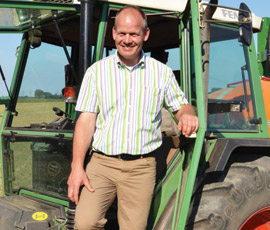German wheat thrives in fertile Rhineland soils

German grower Bernd Olligs is pleased with his increased wheat yields this summer although his oilseed rape has disappointed after a late and cold spring.
Reflecting a picture seen by many British farmers, Mr Olligs say his wheat did well and reached 10t/ha, while rapeseed off his farm suffered from the weather.
His milling wheat yields were up 0.5t/ha from last year on his fertile silty Rhineland soils where around 40% of his land is down to winter wheat.
“We were happy with the wheat but the oilseed rape was not so good,” he tells the Farmers Weekly.
This summer his rapeseed resulted in a respectable 4.2t/ha yield, but this was down around 1t/ha on last year’s harvest.
“This year the flowering of the rapeseed was at the end of April rather than the beginning of April,” he adds.
The cropping area extends to 115ha at his Damianshof arable family farm, but he shares equipment with two other farmers to make up a combined 350ha arable block.
He finished his oilseed rape drilling in the first week of September in dry conditions, while wheat sowing will come later as much of it follows potatoes.
Situated in a big coal mining area, the farm is just over a mile from a massive coal-fired power station and this creates a slightly warmer microclimate.
Like many of his British counterparts, he is in need of rain especially as the surrounding coal mines pump water out of the ground to keep the water table low.
He is particularly concerned over his sugar beer and potatoes and says he will need rain for a good harvest.
“If there is rain then we will get good sugar beet yields,” he says.
His farm at Rommerskirchen, around 30 miles east of Cologne, was chosen by Bayer CropScience for one of its handful of forward farms in continental Europe.
The agrochemicals giant provides advice on sustainable agriculture to Mr Olligs, while being able to demonstrate new practices to other farmers.
Mr Olligs says the knowhow he get from Bayer is helpful such as the installing of a so-called septoria timer in his fields.
This sensor-based system measures rainfall, temperature and leaf wetness, and Mr Olligs estimates that he can cut fungicide use by 5% through the better timing of sprays.
Bernd Olligs was happy with his 10t/ha yield of milling winter wheat from this summer’s harvest on his Rhineland farm.
High milling quality could cut wheat imports

